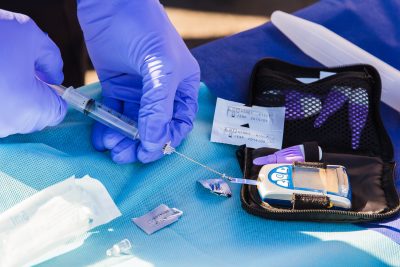Gut Microbiome-Arsenic-Diabetes Interactions
The gut microbiome has a profound effect on human health through its key role in metabolic regulation, and is therefore a promising target for intervention and therapeutic treatment in human health. Evidence supports the role of the gut microbiome and the Farnesoid X receptor (FXR) in the prevention of diabetes in both animals and humans. Building on this knowledge, researchers in Project 3 seek to determine how the inorganic arsenic-altered gut microbiome affects type 2 diabetes risk.

Evidence supports the role of the gut microbiome and the Farnesoid X receptor (FXR) in the prevention of diabetes in both animals and humans.
Using innovative techniques, researchers in Project 3 will characterize largely unknown contributions of gut microbiome-bile acid-FXR in inorganic arsenic-induced diabetes. The highly modifiable nature of the gut microbiome and in-depth mechanistic understanding of the role of the microbiome in disease will allow for the development of new tangible approaches to reduce inorganic arsenic-induced diabetes by targeting the gut microbiome and related signaling molecules.
The significance of these studies lies in the potential of the microbiome-exposure interaction as a novel mechanism of inorganic arsenic-induced disease. Through this research, we aim to overcome a critical barrier and knowledge gap in identifying new interactive factors and molecular targets for disease treatment and prevention.
Project Leader

Dr. Kun Lu
Kun Lu, PhD
Associate Professor, Department of Environmental Sciences and Engineering
Gillings School of Global Public Health
UNC-Chapel Hill
Co-Investigators

Dr. Balfour Sartor
Balfour Sartor, MD
Midget Distinguished Professor of Medicine, Microbiology and Immunology, Division of Gastroenterology and Hepatology
Co-Director, UNC Multidisciplinary IBD Center
UNC-Chapel Hill

Dr. Miroslav Styblo
Mirek Styblo, PhD
Professor, Department of Nutrition
Gillings School of Global Public Health
UNC-Chapel Hill

Dr. Fei Zou
Fei Zou, PhD
Professor, Department of Biostatistics
Gillings School of Global Public Health
UNC-Chapel Hill

Dr. Tim McDermott
Timothy McDermott, PhD
Professor, Land Resources and Environmental Sciences
Montana State University
